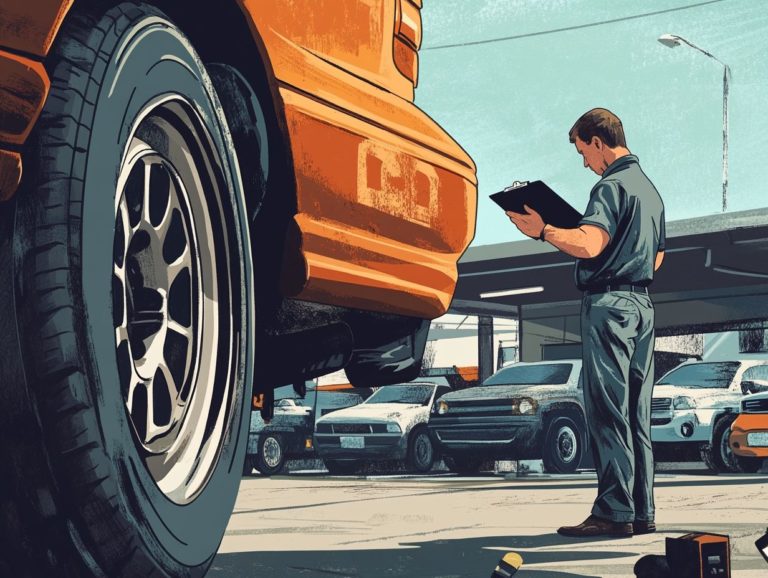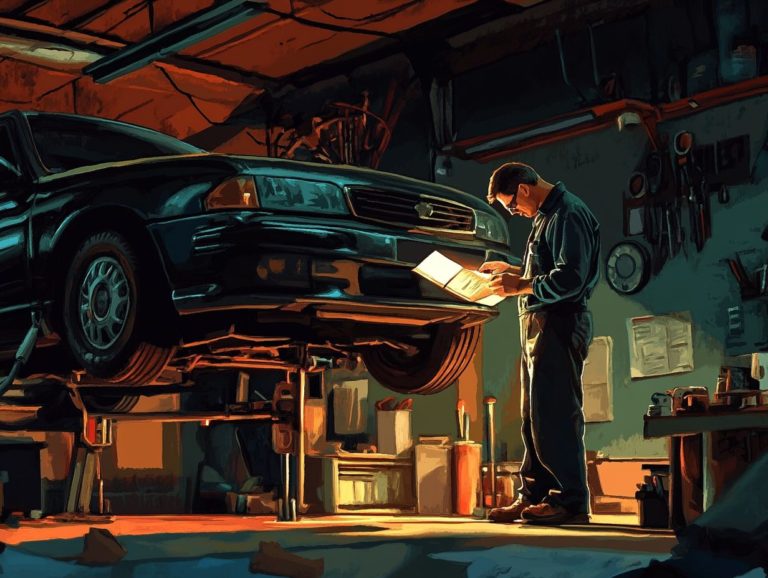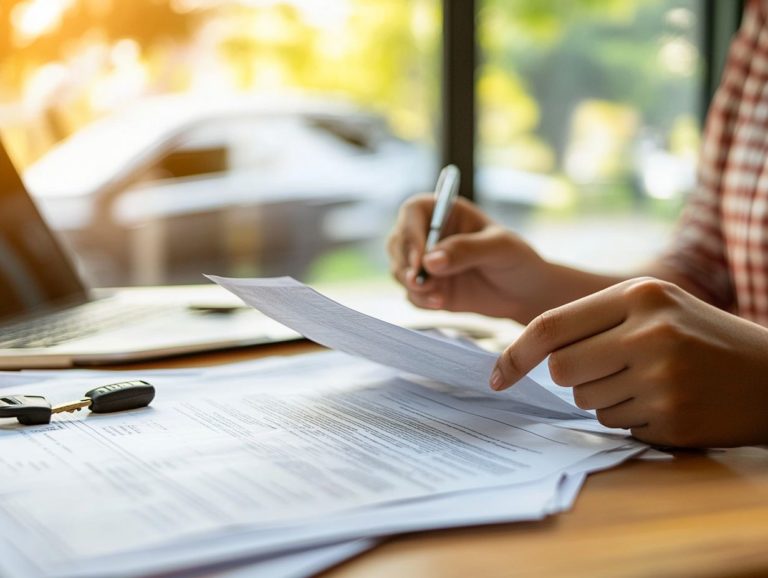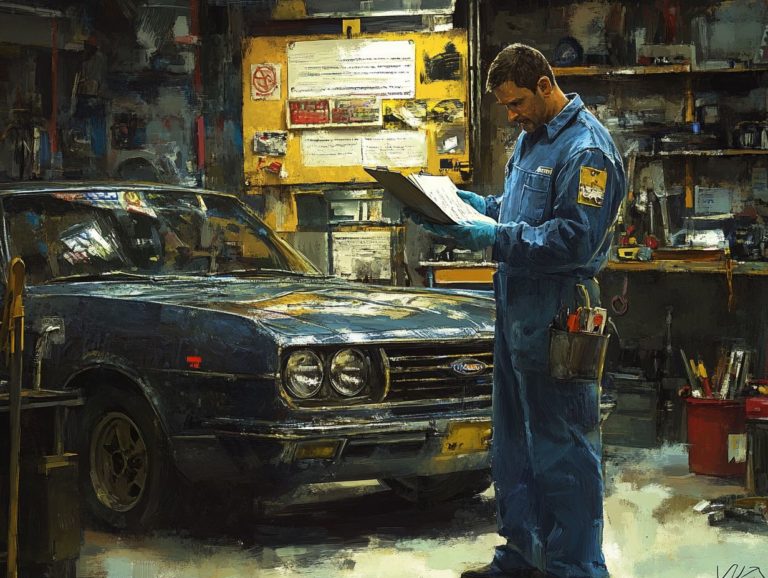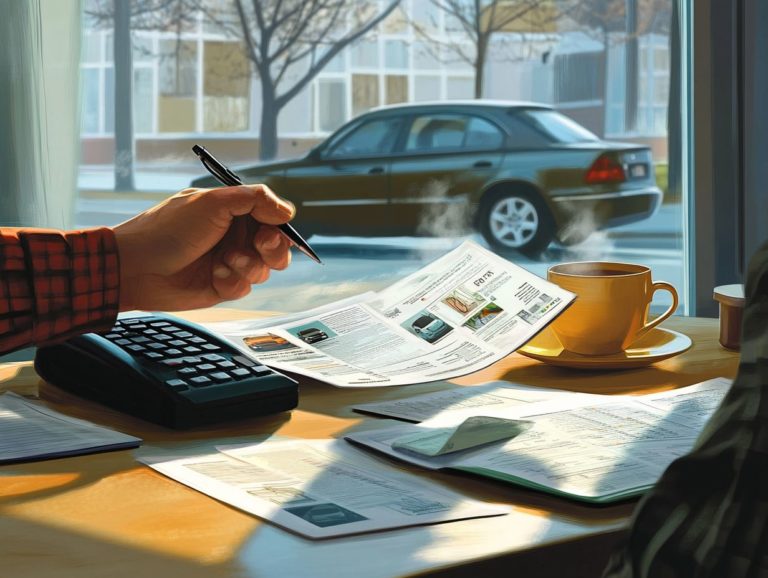5 Questions to Ask a Used Car Dealer
When contemplating the purchase of a used car, asking the right questions can significantly elevate your buying experience. This guide outlines essential inquiries that will empower you to uncover the vehicle’s history, evaluate its condition, and gain insight into the dealership s policies.
Having a well-crafted set of questions helps you make an informed decision. Explore the details of buying a used car and equip yourself with the confidence to navigate this landscape seamlessly!
Contents
- Key Takeaways:
- 1. What Is the Vehicle’s History?
- 2. Has the Car Been Inspected by a Mechanic?
- 3. Are There Any Known Issues or Repairs Needed?
- 4. What Is the Warranty or Return Policy?
- 5. Can I Take the Car for a Test Drive?
- What Are the Financing Options?
- Can I See the Vehicle’s Title and Registration?
- Are There Any Additional Fees or Charges?
- What Is the Dealer’s Reputation and Customer Reviews?
- What Are the Terms of the Sale Agreement?
- Can I Get the Car Checked by an Independent Mechanic?
- What Are the Available Payment Options?
- Is There a Return Policy for the Vehicle?
- Can I Get a Vehicle History Report?
- What Are the After-Sale Services Offered by the Dealer?
- Are There Any Special Deals or Discounts Available?
- Frequently Asked Questions
Key Takeaways:
- Ask for a vehicle history report to check for a clean record.
- Have a mechanic inspect the car for hidden issues.
- Inquire about warranty and return policies for peace of mind.
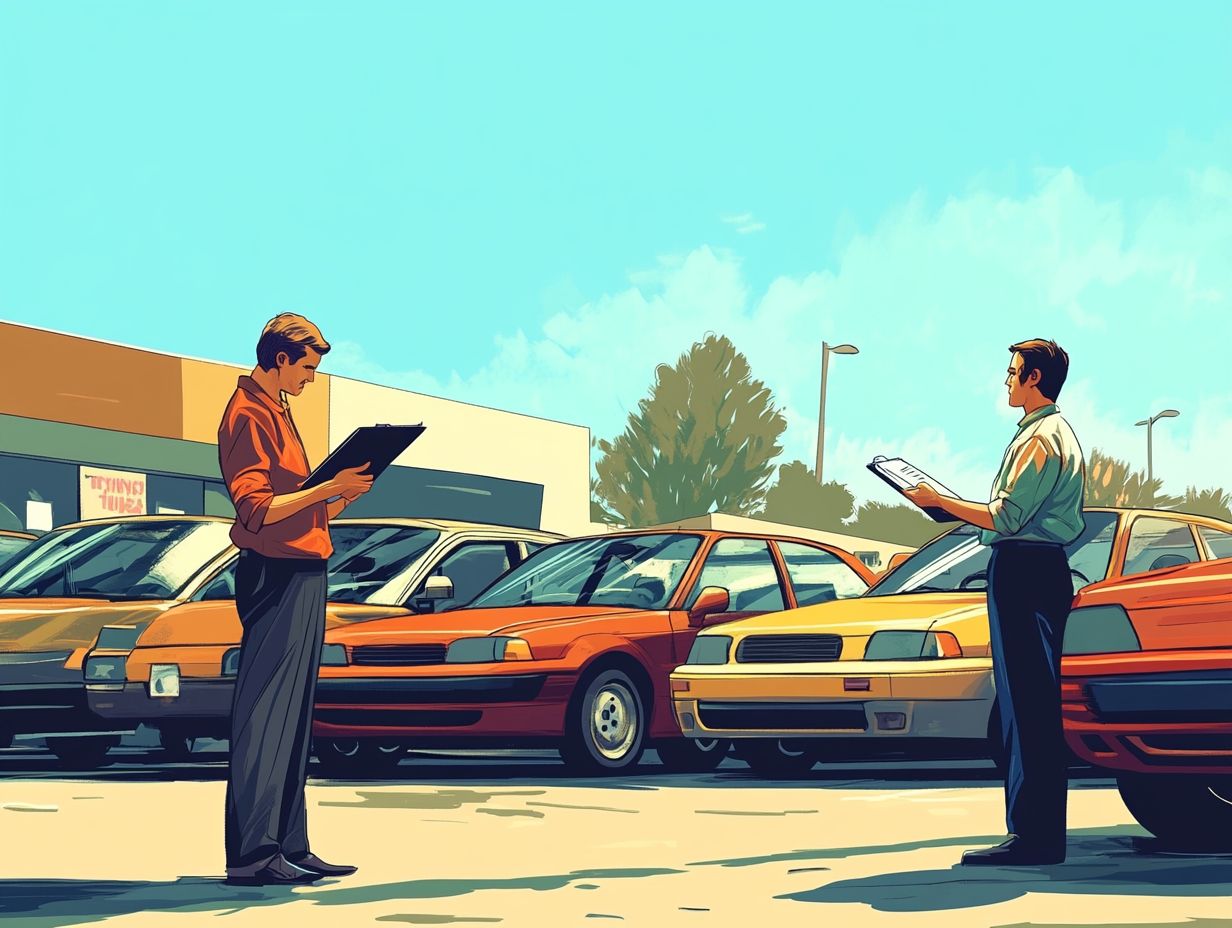
1. What Is the Vehicle’s History?
Understanding the history of a vehicle is essential when you’re in the market for a used car. It reveals past ownership details, accident records, and any lurking mechanical issues.
Accessing a reliable vehicle history report through services like Carfax or AutoCheck can significantly influence the car’s value and equip you with the tools to negotiate effectively.
By utilizing the vehicle identification number (VIN), which is a unique code used to identify individual motor vehicles, you can check for recalls or any reported issues by the National Highway Traffic Safety Administration, ensuring you secure the best deal on your next purchase.
A thorough vehicle history can uncover whether the car has been involved in serious accidents, indicating extensive repairs and a potential drop in value. It’s wise for buyers to keep an eye out for signs of odometer fraud, a history of major repairs, and the number of previous owners.
Verifying the vehicle’s title status is crucial; a salvage or rebuilt title can substantially affect its resale value. Ultimately, having this knowledge enables you to negotiate confidently and avoid vehicles that could lead to future financial headaches.
2. Has the Car Been Inspected by a Mechanic?
Before finalizing your used car purchase, it s crucial to confirm that the vehicle has been inspected by a qualified mechanic. Don’t skip this vital step!
This inspection can reveal hidden mechanical issues that might impact the car’s performance and safety.
An independent inspection not only uncovers existing problems but also provides a comprehensive maintenance history, allowing you to grasp how well the car has been cared for over time.
Understanding the vehicle s past can be a game changer in your negotiations, enabling you to make informed decisions and potentially leverage the findings to negotiate a better price.
By pointing out any red flags or necessary repairs identified in the inspection, you can secure a more favorable deal, ensuring your investment is sound and that you are getting reliable transportation.
3. Are There Any Known Issues or Repairs Needed?
Identifying any known issues or necessary repairs on a used car is essential for understanding its overall condition and potential long-term value, enabling you to avoid costly surprises later on.
To explore this critical aspect thoroughly, don t hesitate to ask the seller specific questions about the vehicle’s maintenance history. Requesting to review service records can uncover past repairs and any recurring problems, offering you valuable insights into how well the car has been cared for.
Transparency in these discussions allows you to assess not only the vehicle’s reliability but also the seller’s honesty. A seller who is forthcoming about the car’s background fosters trust, which is vital for making a well-informed decision about such a significant investment.
4. What Is the Warranty or Return Policy?
Understanding the warranty or return policy associated with a used car helps you feel secure and protects your finances from unexpected issues after your purchase. Knowing the types of warranties available can greatly enhance your buying experience.
Used car dealerships typically offer several warranty options, including:
- Limited warranties that cover specific components for a defined period.
- Powertrain warranties that cover key components like the engine and transmission.
- Comprehensive warranties that provide broader coverage.
Each type has its pros and cons. For instance, while limited warranties may be easier on the wallet, they could leave some parts of the vehicle exposed. Comprehensive warranties might require a higher investment but offer extensive protection.
A clear return policy is critical. It safeguards you from making a purchase that you might later regret. A generous return window allows you to reassess your decision, ensuring you feel confident in your choice. This builds trust between you and the dealership, making the entire process more satisfying.
5. Can I Take the Car for a Test Drive?
Taking a used car for a test drive is a crucial step in your purchasing journey. It allows you to evaluate the vehicle s condition, driving experience, and any potential mechanical issues firsthand.
Pay close attention to the car’s mileage; it can indicate wear and tear. Notice how the vehicle responds to acceleration, braking, and steering this will provide valuable insights into its overall performance.
Comfort is equally important. As you settle into the seat, consider factors like legroom, visibility, and material quality.
Before you hit the road, don’t hesitate to ask detailed questions about the car’s maintenance history, previous ownership, and any repairs. Getting this info now empowers you to make the best choice!
What Are the Financing Options?

Checking financing options is key to your purchase, as it impacts your overall cash price and monthly payments. It s essential to identify a financial strategy that aligns perfectly with your budget and goals.
Whether you re considering traditional loans, leasing arrangements, or trade-ins, each option offers unique advantages and challenges that deserve your careful attention.
- Loans might provide lower monthly payments and lead to ownership once fully paid off.
- Leasing offers flexibility with newer models at potentially lower upfront costs.
- Trading in your existing vehicle could significantly lower the total purchase price, alleviating some financial pressure.
Understanding the insurance requirements is equally important. Knowing the type, coverage, and costs involved allows you to seamlessly integrate these expenses into your financing plan, ensuring a smoother and more manageable ownership experience.
Can I See the Vehicle’s Title and Registration?
Requesting to see the vehicle’s title and registration is essential for verifying ownership and ensuring there are no liens or legal issues tied to the used car you re considering.
Understanding the vehicle’s title history provides valuable insights into any past accidents, salvage status, or odometer discrepancies that could significantly affect the car’s value.
As a buyer, carefully examine the registration document for key details like the Vehicle Identification Number (VIN), the owner’s name, and any previous title changes. This information helps confirm that the vehicle hasn t been declared a total loss or undergone major repairs.
By thoroughly reviewing this documentation, you can make a well-informed decision and avoid costly mistakes in your purchase.
Start your used car journey today check out your financing options now!
Are There Any Additional Fees or Charges?
Before you seal the deal on a used car, take a moment to ask about any additional fees or charges that might sneak their way into the final price. These costs can significantly impact your total expenditure.
Common fees like dealer processing charges and registration fees can accumulate quickly. These hidden expenses often leave buyers feeling blindsided. By addressing these potential extra costs early in the process, you can gain a clearer picture of your overall financial commitment.
It s often possible to negotiate these fees with the dealer. Yet, many people overlook this vital opportunity, inadvertently putting their budget at risk. By understanding these nuances, you ensure that you secure a dependable vehicle while maintaining an advantageous deal free from unexpected financial surprises after the purchase.
What Is the Dealer’s Reputation and Customer Reviews?
Researching a dealer’s reputation and customer reviews is crucial when considering a purchase from a used car dealership. This insight will shed light on their reliability and the quality of the vehicles they offer.
In today s digital landscape, platforms like Facebook Marketplace and Craigslist have become invaluable resources for savvy buyers. Before sealing any deal, take the time to explore customer feedback on these platforms, as it often showcases genuine experiences from previous clients.
By sifting through reviews, you can identify patterns in both positive and negative interactions. This helps pinpoint trustworthy dealers and assists you in evaluating pricing fairness while uncovering potential issues with the cars themselves.
Ultimately, selecting a reputable dealer leads to more than just a great deal; it provides you with peace of mind throughout the buying process. Don t miss out on the best deal do your research today!
What Are the Terms of the Sale Agreement?
Understanding the terms of the sale agreement is essential to achieving clarity on pricing, conditions, and your rights as a buyer. This knowledge enables you to secure a favorable deal.
By carefully checking key components such as payment terms, warranty coverage, and return policies, you can make well-informed decisions.
Payment terms dictate when and how much you re required to pay, significantly impacting your overall affordability. Warranty coverage offers peace of mind by specifying what is protected and for how long.
Clear return policies make it easy to exchange or refund your purchase if it doesn’t meet your expectations. Overlooking this critical step can lead to misunderstandings or financial setbacks, underscoring the importance of paying attention to every detail in the agreement.
Can I Get the Car Checked by an Independent Mechanic?
Requesting an independent mechanic to check the car is a wise decision. This ensures that the vehicle is free from hidden mechanical issues that might elude a casual inspection.
This extra layer of scrutiny can lead to significant cost savings down the road. It helps uncover problems that could escalate into costly repairs if ignored. You gain peace of mind, knowing you re making a well-informed purchase.
An independent inspection not only highlights existing flaws but also protects your investment for the long haul. By opting for an evaluation by a knowledgeable third party, you can sidestep unexpected financial burdens linked to repair costs after the sale.
What Are the Available Payment Options?

Understanding the various payment options available for purchasing a used car enables you to make an informed decision that aligns with your financial situation.
Exploring options like cash payments, financing alternatives, and trade-ins can significantly influence the final price you pay and your overall budgeting.
Cash payments might provide immediate peace of mind, often leading to potential discounts from sellers eager for a quick transaction. Financing offers flexibility, allowing you to spread out the cost over time, making a higher-priced vehicle more accessible.
Trade-ins can also be a savvy choice, decreasing the amount you need to finance. This ultimately affects your monthly payments and total expenditure. It s essential to evaluate each method carefully to discover the option that best meets your needs for affordability and long-term financial health.
Is There a Return Policy for the Vehicle?
Inquiring about the dealership’s return policy is essential for ensuring your protection in case the vehicle doesn’t quite meet your expectations after the purchase. An effective return policy should clearly articulate the time frame for returns, any specific conditions that need to be satisfied, and whether you ll receive a refund, exchange, or credit.
This level of transparency builds trust and confidence, enabling you to make informed choices without the anxiety of being left with a vehicle that doesn t fit your needs. A favorable policy cultivates a sense of security, often encouraging potential buyers like you to proceed with the purchase, knowing there’s a safety net if things don’t pan out.
Understanding these terms can impact your buying decision and ultimately lead to securing a deal that satisfies you.
Can I Get a Vehicle History Report?
Obtaining a vehicle history report from reputable services like Carfax or AutoCheck is essential for grasping the past incidents, ownership history, and overall reliability of a used car. This report is a cornerstone of the car-buying journey, offering you invaluable insights into any accidents, title issues, or service records associated with the vehicle.
To request the report, all you need is the vehicle identification number (VIN), a unique code used to identify the vehicle, which is typically located on the dashboard or inside the driver’s side door.
When examining the report, pay close attention to key details such as:
- The number of previous owners
- Any reported damages
- Service history
- Whether the car has a clean title
This information not only aids in evaluating the vehicle’s market value but also significantly reduces the likelihood of purchasing a lemon, ultimately ensuring your peace of mind and making for a wise investment.
What Are the After-Sale Services Offered by the Dealer?
Understanding the after-sale services offered by the dealership can truly elevate your purchasing experience, giving you the support and peace of mind you deserve after acquiring your used car.
These services typically include essential elements like maintenance plans, warranties, and dependable customer support. When you’re well-informed about these offerings, you re more likely to feel assured in your decision, knowing that reliable assistance is just a call away.
Effective maintenance services ensure your vehicle stays in top-notch condition, enhancing its longevity and performance. Meanwhile, comprehensive warranties protect you from unexpected repair costs, building trust in the quality of your purchase.
Prioritizing these aspects can significantly boost your overall satisfaction and transform what could be a simple transaction into a valuable investment.
Are There Any Special Deals or Discounts Available?
Inquiring about special deals or discounts can lead you to substantial savings when purchasing a used car, making it essential to ask the dealer about any available promotions.
Many dealerships offer enticing holiday promotions, particularly during festive seasons like Memorial Day or year-end sales, which can significantly reduce your final purchase price.
By signing up for loyalty programs, you can unlock additional benefits, such as exclusive access to enhanced discounts or cash back on future purchases.
Don t overlook trade-in bonuses either; these can sometimes be stacked on top of existing deals, amplifying your savings even further.
Being aware of these opportunities not only elevates your buying experience but also ensures that you reap significant financial rewards.
Frequently Asked Questions
1. What should I ask a used car dealer before making a purchase?

Before you buy, ask the right questions to secure the best deal! These five questions, including what to ask when buying a used car, will help you make an informed decision:
2. How long has the car been on the market?
Knowing how long a car has been on the market can give you an idea of its demand and potential issues. A car that has been on the market for a long time may have underlying problems or may be overpriced.
3. Can I see the vehicle’s maintenance records?
Requesting to see the car’s maintenance records can give you insight into its history and any potential issues it may have had. It’s important to review these records before making a purchase.
4. Is there a warranty included with the purchase?
Some used car dealers offer a warranty, while others do not. Always confirm if a warranty is included and what it covers.
5. Can I take the car for a test drive?
Test driving is essential before making a purchase. It helps you assess the car’s performance and uncover any issues.
6. Are there any known issues or damages with the car?
Ask the dealer about any known issues or damages. Request a vehicle history report, which shows the car’s past ownership and any accidents, to avoid surprises.

